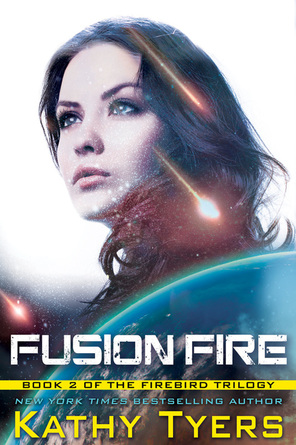 Interview by Brock Eastman Featuring Fusion Fire A New Life for Lady Firebird Forced to forsake her royal heritage, Lady Firebird now faces new and powerful enemies. Firebird is pregnant with twins when her new husband, Brennen Caldwell, is left as the only heir to ancient messianic prophecies. Meanwhile on another world, Firebird’s sister defects to the enemy camp and is made a prisoner. Brennen’s superiors ask him to try to rescue her, and Phoena’s desperate husband travels light-years trying to enlist Brennen’s aid. But Brennen is not tempted to comply… until a divine dream sends him exactly where he does not want to go. “Sweeping drama in deep space… a plot filled with action and intrigue. Thought-provoking without being preachy.” —Moody Magazine Brock: I'm honored and excited to interview Kathy Tyers; a pioneer and champion for the Christian Science-Fiction genre. If not for her development of the genre, my own series might never have been published. Kathy, how did you come up with the idea for the Firebird series? Kathy: During the summer of 1983, the third Star Wars movie was released and the U.S. Air Force Thunderbirds came to town. While working in my vegetable garden I tried to imagine a sequel to “Return of the Jedi,” and one night I stayed up feverishly writing down notes. The first draft of that novel was unpublishable fan fiction—but I joined a writers group and started learning the craft, replacing all the copyrighted material with my own ideas and characters. On a note of delightful irony, ten years and four novels later I was asked to write a Star Wars novel that took take place during exactly the time period I had imagined that summer in the vegetable garden. Brock: It’s neat to see how God works things out. We’ll talk about Star Wars later. First, though, tell us about the main characters in Fusion Fire: Who are they, and what makes them unique? Kathy: Lady Firebird is a wastling, the extraneous third child of a noble family, and she was born only for insurance that the line won’t die out. When her eldest sister’s heirs are born, she is expected to seek a noble death. She trains as a fighter pilot and is sent on a suicide mission. But things don’t work out that way. Brennen Caldwell is the only surviving son of an ancient messianic lineage. He’s a man of deep faith, but because of his ancestors’ experiments in genetic engineering, he is also a highly trained telepath. Recently I read that a reader had called him “swoon-worthy.” Brock: That sounds like high praise. Would you mind giving us one fact about each main character that no one else knows? Kathy: When Firebird was in her early teens, on vacation at the family retreat at Hunter Height, she went out with a group of friends for a day of hunting. She was an excellent shot, but she couldn’t bring herself to pull the trigger, and for the rest of the vacation she was mercilessly belittled by her older sister Phoena. Phoena is one of the main villains in Firebird and Fusion Fire. Brennen isn’t fond of traveling passenger-class or even as command staff. He would much rather pilot. Brock: It’s always fun to hear information the author knows, but has not shared in the story. In three sentences, what is Fusion Fire about? Kathy: Firebird is forced to confront her own sin and darkness, even though she’s a “good” person. It’s also about two rescues, one that succeeds and one that goes terribly wrong. And Firebird and Brennen learn that sometimes, there’s a terrible price for keeping vital secrets. Brock: When writing, do you outline the entire book, or do you write as you go and let the characters take control of the story? Kathy: I’m an outliner. It’s partly because I have a bad memory but also because I have a compulsive need to get things right. The first full draft of one of my books reads like a sketchy outline of the scenes, plus dialogue. I hear my characters speaking long before I can see them. I make several self-editing passes and add “sedimentary” layers of subplot, setting, etc. Brock: This sounds like a great process. Often I find myself having to completely rewrite a section if not well outlined or if my characters get a bit out of hand. As this is a five book series, did you plot or outline the whole thing before you began writing? Kathy: Originally, I had a very different five-book series in mind. Bethany House Publishers ended the series as a trilogy, so I had to telescope Crown of Fire from two book outlines into a single novel. Wind and Shadow and Daystar took shape while I was working on a degree in Christianity and the Arts at Regent College in Vancouver, BC. Brock: How do you believe the “Firebird” series relates to the lives of readers? Kathy: In the “Firebird” series, humanity’s history changed direction even before Christ was born. I think readers have enjoyed following this what-if thread of alternate history, as well as the deepening relationship of two warrior heroes who are deeply in love with each other and their God—but who certainly aren’t the type to settle down and live happily ever after. Not even as parents… but that’s another story. Brock: Kathy, I can probably guess this. But what is your favorite genre to write? Kathy: I’ve written speculative fiction for many years, mostly space opera and hard science fiction. Right now, I think I’d like to try my hand at contemporary fantasy. Brock: Expanding horizons. Would you mind explaining “hard” science fiction for people who don’t know the speculative subgenres? Kathy: That’s science fiction in which the plot revolves around solving a scientific question that’s true to science as we currently understand it. My hard SF novel, Shivering World, is about one character’s quest for healing, but the plot also addresses issues of genetic engineering and terraforming. And since you might ask: “terraforming” is the hypothetical science in which certain uninhabitable planets might gradually be modified to support life as we know it. Brock: Ironic you mention terraforming; because it was a part of the manuscript I just finished up. I think it’s one of the more exciting hypothetical scientific fields to be explored in space exploration and colonization. What is the biblical background or basis for the Firebird series? Kathy: God keeps his promises no matter how long it takes, and his character never changes. Brock: That’s an assurance we can certainly draw hope and find peace from. How many books are in the series? Kathy: Fusion Fire is #2 in a series of five: Firebird, Fusion Fire, Crown of Fire, Wind and Shadow, and Daystar. Brock: Any certain research required for the books, or is it all from your imagination? Kathy: Well, I read a lot about high-performance military aircraft and discussed battle strategies with some folks who had military experience—and I took a ride with an aerobatics pilot, in order to see how some of those maneuvers actually felt. I also studied the “worldbuilding” aspects of astronomy and geology that it takes to imagine believable worlds, and I highly recommend Stephen L. Gillett’s Worldbuilding: A writer’s guide to constructing star systems and life-supporting planets. Brock: Thanks for the recommendation; I’ve put it on my wish list. How do you strike the right balance in your book? Kathy: Oh, I just keep the plot moving and the characters’ interaction (and personal growth) front and center, and try and make sure that every scene, including every viewpoint shift, drives the plot. Those self-editing passes include lots of re-reading, to see if I lose interest anywhere. Having a baddish memory helps with self-editing, because it enables me to read the current version as if I hadn’t read the previous drafts. Brock: This is an issue I often run into. I’ll find myself adding a detail or dialogue, only to find I said the same thing two paragraphs later. What has been your readers’ feedback on the ‘Firebird’ series? Aside from the, “Swoon-worthy” Brennen Caldwell. Kathy: I was deeply honored when the fifth Firebird novel, DAYSTAR, won the speculative fiction Carol Award from the American Christian Fiction Writers for the year of its original release, 2013. But an even higher honor came when a young woman at my church told me she had decided to become a Christian after reading Firebird. She invited me to her baptism. Wow. Brock: That’s an honor and a celebration. I can’t think of a higher praise for your work. After our work is often a vessel for God’s message to be delivered to others. Why did you choose to focus on a female protagonist? Kathy: It’s just more natural for me to write deep, third-person viewpoint from a woman’s perspective. But since these books include scenes from my male characters’ viewpoints too, I tried to write them just as believably. The bottom line, even when you’re writing villains, is to make every character a sympathetic, three-dimensional human being. Or alien, if you have aliens. I don’t write aliens. Brock: I don’t write aliens either; though I do have a blue character (it’s from the minerals in his home.) How did you feel about finishing the series? Kathy: I thought that when I sent off the last book, I would struggle with my usual post-book depression. Oddly, instead I had a sense of job-well-done. It felt like I’d finished something I’d been called to do. Brock: Good to know there is a bright side when I turn book five in. Honestly I think I’ve been dragging my feet on the writing because I don’t want to say, “Goodbye,” to my characters. Is it difficult to be accurate to a Biblical perspective or Biblical facts when writing fantasy fiction? Kathy: Actually, I find it a fascinating part of the creative process. The idea of the same God—with the same attributes—keeping the same promises under very difference circumstances, actually drives the plot. Particularly in Daystar. Brock: Are you a full-time or part-time author/writer? And where do you like to write? Kathy: I’ve done both. Right now I do more editing than writing and find it very satisfying, but I would like to get back to writing more. I write mostly at home, at a computer on my desk. But I have vivid memories of writing under deadline on the road. In the passenger seat, of course. Brock: That’s good you’re not typing and driving, though most laws center on texting and talking. I get car sick if I try to read in the car which is a bummer, because we take two thousand mile roundtrips to Illinois each year. How long does it usually take you to write a single book? Kathy: I’m fairly slow. It takes about four months to complete a first draft and eight months to flesh it out and edit the rough bits. Brock: What is your "how I got published" story? Kathy: After my first novel was rejected by a small press and a major science fiction publisher, I got serious about researching the field. In the science fiction trade journal Locus, on the industry news page, I spotted the photo of a smiling young editor at Bantam Books who had just been promoted in-house from “editor for young readers” to “editor” of their Spectra science fiction line. I sent her the then-current revision of Firebird and got to work on another project. At the World Fantasy Conference later that year, I worked up my courage and introduced myself. To my amazement, she recognized my name on my conference badge and apologized for not having read Firebird yet… “But our first reader really liked it.” I lived on hope for the next few months, until a friend told me that his cousin worked with a major Hollywood producer and suggested I submit the novel for possible movie rights. I’d been told at my writers group that it was unwise to submit a book to two publishers/producers at the same time. My writers group encouraged me to telephone the editor at Bantam Spectra. The editor gave me the go-ahead to pursue film rights… and then she said, “And we’re going to publish the book.” I think there are still handprints on the ceiling of the apartment where we were living. Bantam Books—this was huge! It was my third Bantam editor who telephoned in 1993 to ask if I would like to be a Star Wars author. My response: “Um, let me think about that... YES!!” Brock: What a journey, but what a payoff. Not only did you have your own original work being published, but you were getting to work on a brand that inspired you. And as promised, tell us about your experience with Star Wars. Kathy: People usually ask how I got to write a Star Wars tie-in novel. Alas, it was simply because I had already published four science fiction novels with the publisher (Bantam) that got the book contract from Lucas Licensing. I got a second chance when a different New York publisher (Del Rey) got the Star Wars contract, and—get this—one of the editors who had originally read and rejected Firebird scolded me for not rewriting it and sending it back to her… and she asked me to participate in their “New Jedi Order” series. I can’t tell you how honored I felt. So that was my second Star Wars invitation. Did I have any doubts about writing Star Wars? Not the first time. But the second time, I was already working with Steve Laube, who was at Bethany House Publishers, on the third novel in my Firebird series. I was actually more excited about the Firebird books than Star Wars at that point, so I asked Steve for advice. He laughed like he thought I was crazy, and he told me to take Del Rey’s offer. It was the only time in my life that I wrote two books in a single year. I don’t think I would do it again. The stress was overwhelming. But what a year! Brock: Understandable. I tend to overcommit to projects, but somehow I always finish. Someday I will learn to pace myself. What was your favorite book as a teen or child? Kathy: Lord of the Rings. Nothing else came close. Brock: Who is one author, living or dead, that you would co-write a book with and why? Kathy: Great question. Dorothy L. Sayers, if she’d take me on. I could learn so much from studying her style, hearing about her Oxford education and her other life experiences. And perhaps she’d enjoy dabbling in another genre. I loved her “Lord Peter Wimsey” mysteries, which are set in England between the wars. Hmm, that’s the same era as “Downton Abbey.” Brock: Coke or Pepsi? Kathy: Neither. Give me a cup of black tea with a splat of almond milk, summer or winter. Brock: Favorite place to vacation? Kathy: Most recently: a dude ranch in off season for my autumn honeymoon. We hope to revisit Ireland someday soon. And I try to get back to Vancouver BC every summer to take a spring/summer school class at Regent College. That’s a different kind of vacation, not particularly relaxing (getting an education at Regent College is like getting a drink from a fire hose) but soul-nourishing. Brock: I have always wanted to go to Ireland. I may even write a story about it, just so I can visit the emerald isle for research. Favorite season? Kathy: Spring, especially after a long Montana winter. Seeing the first daffodil sprouts, buds swelling on the fruit trees, and the unfurling rhubarb leaves gives me the grins. Brock: Favorite pasta dish? Kathy: I make spaghetti from white rice pasta, homemade tomato sauce (preferably with homegrown heirloom tomatoes), and ground bison or venison. My recipe blog is comfortablecomfortfoods.com, and I’ve got a fantastic lemon-almond-basil pesto recipe there that’s also excellent on pasta. Brock: Yummy. I'll be turning my wife (who loves cooking and baking) on to your blog. Do you listen to music while you write? If so, what are some examples? Kathy: When I’m writing a rough draft, the right music puts me in exactly the right mood. But I never listen to music when I’m editing, since I need to know that the emotion is on the page, not in the music. When I was writing the Firebird series, some of my favorites were the soundtrack to “The Man from Snowy River,” Tchaikovski’s fourth and fifth symphonies, and a Cincinnati Pops recording called “Victory at Sea and Other Favorites.” Brock: I completely agree, music can certainly put me in the exact right mood. I love the pace and the drama it can create while I write. Kathy, thank you for taking time to share about your “Firebird” series and your writing journey. I know you’ve inspired me. I look forward to whatever future projects you write. 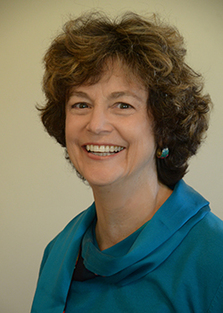 Kathy Tyers is known for her Star Wars Expanded Universe novels - The Truce at Bakura and New Jedi Order: Balance Point. The "Firebird" series, Firebird, Fusion Fire, and Crown of Fire have been available for years. She also have five other science fiction novels, a travel book, and a co-authored book a with a classical guitarist, Christopher Parkening. Kathy lives in south western Montana. Author Website: KathyTyers.com Author Facebook: https://www.facebook.com/kathytyers/
0 Comments
Leave a Reply. |
Follow meArchives
May 2024
Categories
All
|
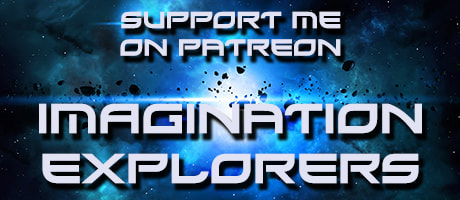
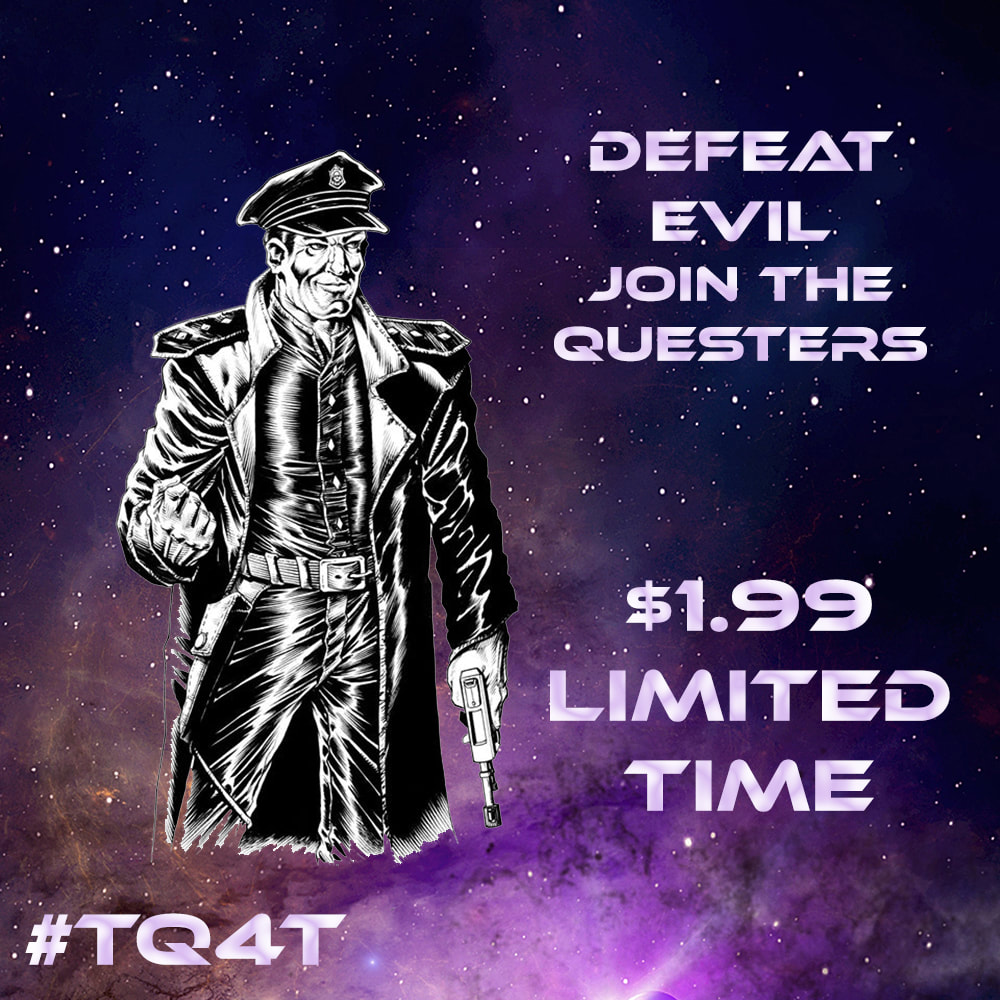
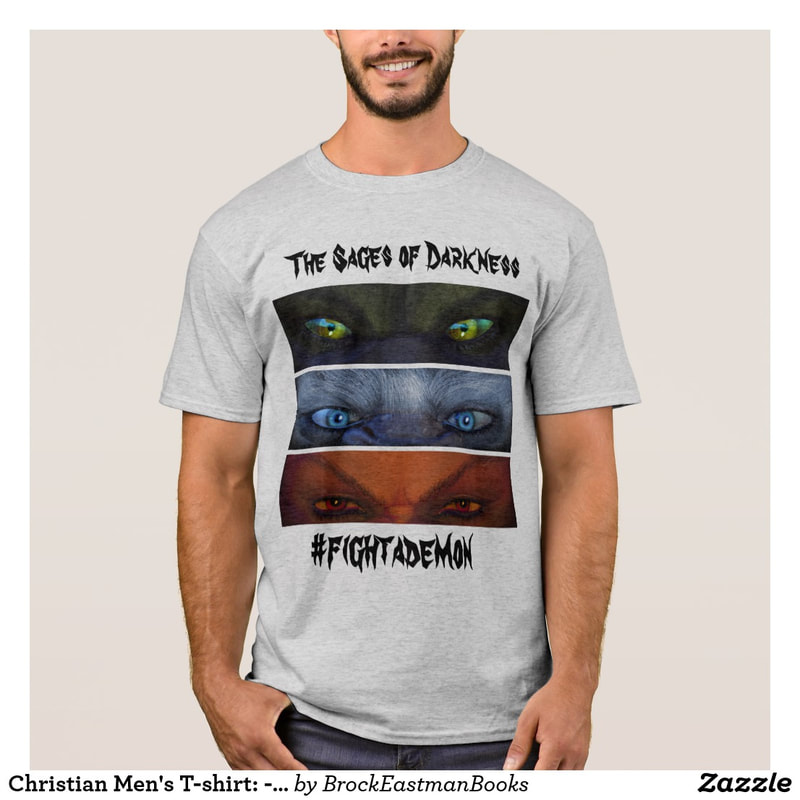

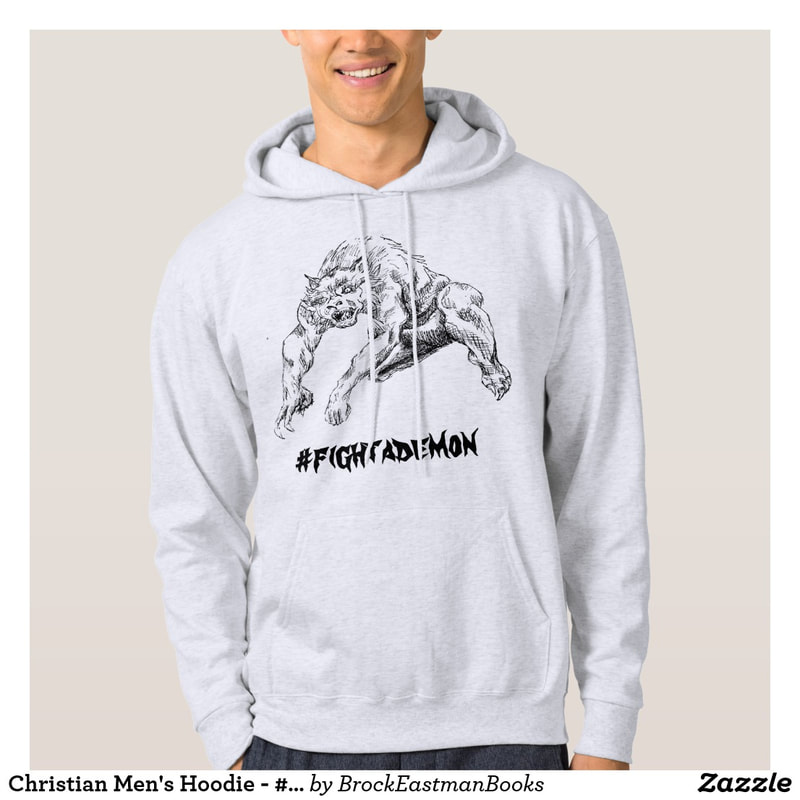

 RSS Feed
RSS Feed